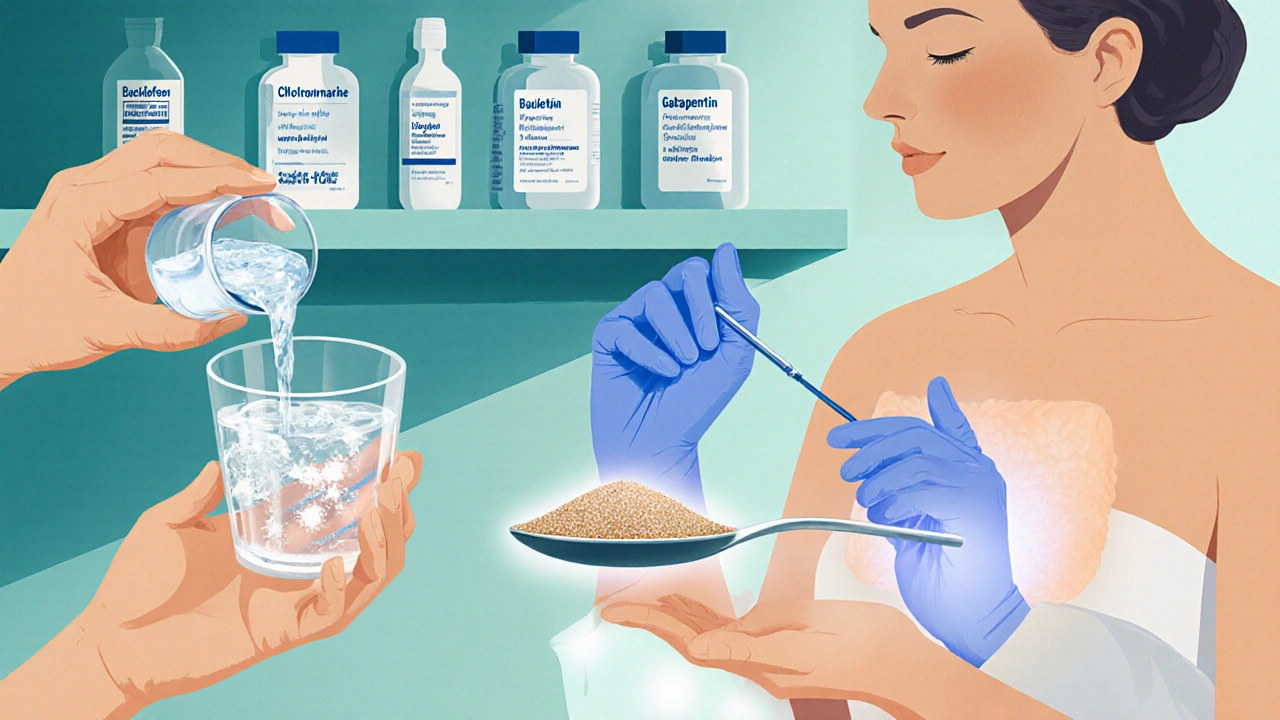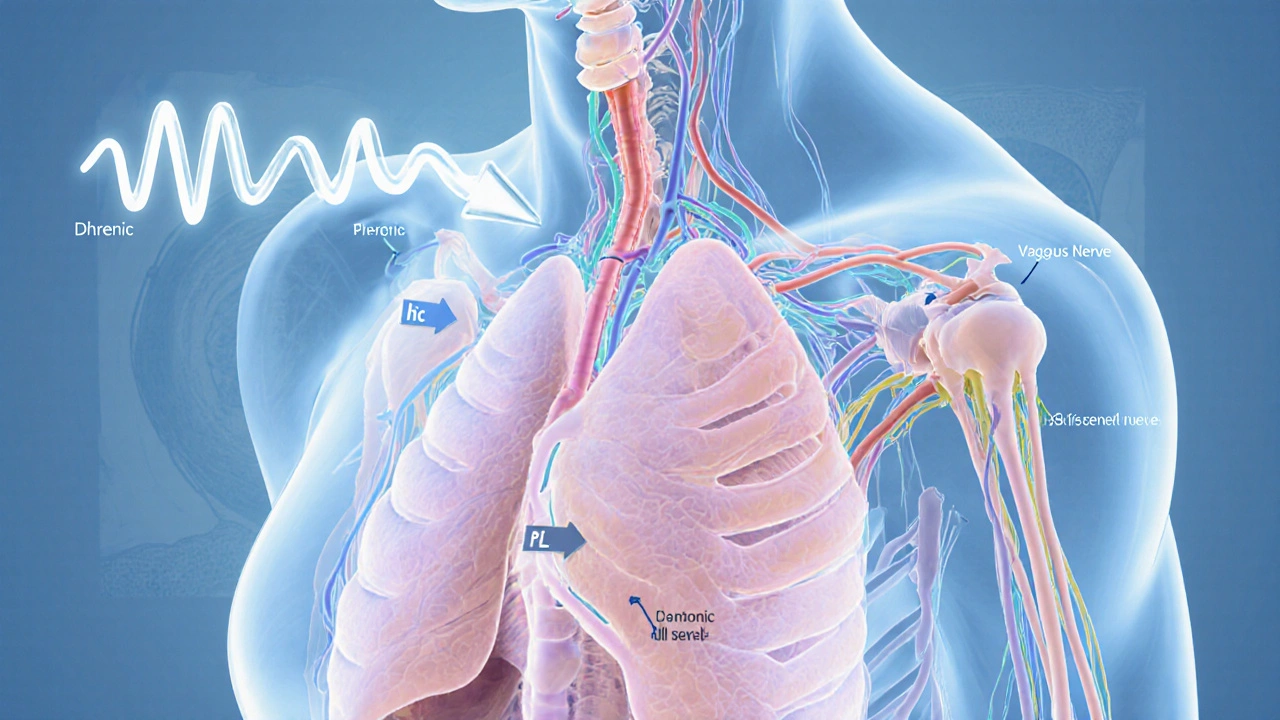Persistent Hiccups: Trigger Identifier
Potential Triggers Identified
Enter your symptoms and click "Analyze Potential Causes" to identify possible triggers for your persistent hiccups.
Common Triggers Overview
Gastrointestinal Triggers
GERD, acid reflux, or stomach irritation can stimulate the vagus nerve.
Medication-Induced
Certain drugs like corticosteroids or chemotherapy agents may cause persistent hiccups.
Neurological Causes
Brainstem issues, stroke, or tumors can interfere with hiccup centers in the brain.
Metabolic Imbalances
Electrolyte disorders or diabetes can affect nerve function controlling breathing.
Imagine the annoying "hic" that won’t quit, day after day. Most of us have had a bout that passes in minutes, but when the hiccups linger for 48 hours or more, they become a medical concern. This guide walks you through why hiccups stick around, when they signal something serious, and what you can actually do to stop them.
Key Takeaways
- Hiccups lasting over 48hours are called persistent hiccups and may indicate an underlying issue.
- Common triggers include acid reflux, medication side‑effects, and nerve irritation.
- Red‑flag symptoms-weight loss, vomiting, chest pain-require prompt medical evaluation.
- Doctors use a stepwise approach: history, physical exam, then targeted tests like blood panels or imaging.
- Treatment ranges from simple home tricks to prescription drugs such as baclofen or chlorpromazine.
What Exactly Is a Hiccup?
Hiccup is a sudden, involuntary contraction of the diaphragm followed by a rapid closure of the vocal cords, producing the characteristic "hic" sound.
The reflex involves a three‑part arc: sensory input from the phrenic nerve and vagus nerve, a central processing center in the brainstem, and motor output back to the diaphragm.

Why Do Hiccups Turn Persistent?
Most hiccups resolve on their own because the trigger disappears. When they linger, something is continuously stimulating the reflex arc. Below are the most frequent culprits.
Gastrointestinal Triggers
Gastroesophageal reflux disease (GERD) is a top offender. Acid irritating the esophagus can activate the vagus nerve, sending repeated hiccup signals.
Medication‑Induced Hiccups
Corticosteroids, chemotherapy agents, and certain anesthetics are known to disrupt the diaphragm’s normal rhythm. If you started a new prescription shortly before the hiccups began, flag it for your doctor.
Neurological Causes
Stroke, multiple sclerosis, or a brain tumor can affect the brainstem’s hiccup center. Even minor head injuries sometimes trigger a prolonged episode.
Metabolic & Electrolyte Imbalances
Low sodium (hyponatremia), high calcium (hypercalcemia), or severe diabetes can irritate nerves that control breathing.
Psychogenic Factors
Stress, anxiety, or emotional trauma can manifest as a hiccup pattern, especially when no physical cause is found.
When Should You Call a Doctor?
If hiccups last beyond 48hours, treat them as a symptom, not a nuisance. Seek medical attention promptly if you notice any of the following:
- Unintentional weight loss or inability to eat
- Severe vomiting or dehydration
- Chest pain, shortness of breath, or palpitations
- Persistent coughing or hoarseness
- Neurological signs like weakness, numbness, or vision changes
These red‑flag signs could point to an underlying disease that needs targeted therapy.
How Doctors Diagnose Persistent Hiccups
Diagnosis usually starts with a thorough history: when the hiccups began, recent medication changes, alcohol use, and any gastrointestinal or neurological symptoms.
The physical exam focuses on the chest, abdomen, and neurological assessment. Listening for abnormal breath sounds or signs of reflux helps narrow the cause.
If the initial workup is inconclusive, targeted tests follow:
- Blood panel: electrolytes, glucose, liver and kidney function
- Chest X‑ray: rules out mediastinal masses or pneumonia
- Upper endoscopy: evaluates for severe GERD or lesions
- MRI of the brainstem when neurological involvement is suspected

Treatment Options: From Home Hacks to Prescription Drugs
First‑line remedies are low‑risk and easy to try at home. If they fail, doctors may prescribe medication.
Home Remedies That Actually Work
- Hold your breath for 10-15seconds, repeat three times.
- Drink a glass of cold water quickly, or sip it through a straw while bending forward.
- Swallow a teaspoon of granulated sugar; the grainy texture can reset the nerve signals.
- Apply gentle pressure to the diaphragm area-placing a warm compress on the upper abdomen may relax the muscle.
These methods stimulate the vagus nerve, interrupting the hiccup cycle.
Prescription Medications
When hiccups persist despite home tricks, clinicians turn to drugs that dampen nerve activity. Below is a quick comparison.
| Medication | Typical Dose | How It Works | Common Side Effects |
|---|---|---|---|
| Baclofen | 5mg three times daily | GABA‑B agonist that relaxes the diaphragm | Drowsiness, dizziness |
| Chlorpromazine | 25mg three times daily | Antipsychotic that blocks dopamine, decreasing reflex excitability | Dry mouth, low blood pressure |
| Gabapentin | 300mg at bedtime | Calcium channel modulator that calms nerve firing | Fatigue, swelling |
These drugs are usually prescribed after other causes have been ruled out. Dosages may be adjusted based on age, kidney function, and response.
Advanced Interventions
In rare, refractory cases, doctors may consider nerve blocks (phrenic nerve block) or even surgical options like diaphragmatic pacing. Such measures are reserved for intractable hiccups lasting weeks to months.
Preventing Recurrence
Even after the hiccups stop, staying vigilant helps avoid a comeback.
- Maintain a healthy weight and avoid overeating, which can increase reflux risk.
- Limit alcohol and carbonated drinks; both irritate the esophagus.
- Review medication lists with your pharmacist annually.
- Practice stress‑relief techniques-deep breathing, yoga, or short walks-to keep the vagus nerve calm.
Frequently Asked Questions
Can persistent hiccups be a sign of cancer?
Yes, tumors in the brainstem, neck, or upper chest can press on the phrenic or vagus nerves, triggering prolonged hiccups. Imaging studies like MRI help rule this out.
How long does it take for prescription meds to work?
Most patients notice improvement within 24-48hours, but full effect may take up to a week. If no change after several days, the doctor may switch drugs.
Are there any natural supplements that help?
Some people find relief with ginger tea or peppermint oil, as both can relax the gastrointestinal tract. Evidence is anecdotal, so discuss with a clinician before trying.
Is it safe to use over‑the‑counter antacids?
Yes, antacids that neutralize stomach acid often reduce reflux‑related hiccups. However, long‑term use should be monitored to avoid electrolyte imbalances.
When should I consider a nerve block?
If hiccups persist for more than a month despite medication, and imaging shows no reversible cause, a phrenic nerve block performed by a pain specialist may be an option.


17 Comments
Will Esguerra
October 6, 2025 AT 15:31In the intricate circuitry of the brainstem, persistent hiccups emerge as a maladaptive signal cascade, heralding potential dysregulation of the vagus or phrenic nerves. The clinical implication transcends mere annoyance; it may signify gastrointestinal irritation, metabolic imbalance, or even neoplastic infiltration. A systematic appraisal of duration, associated red‑flag symptoms, and pharmacologic history is indispensable before embarking upon therapeutic interventions.
Allison Marruffo
October 13, 2025 AT 14:11Thank you for outlining the essential red‑flag criteria so clearly; this structure aids clinicians in prioritizing diagnostic work‑ups while reassuring patients that simple home measures remain worthwhile. Maintaining a symptom diary can further delineate patterns and guide targeted testing.
Ian Frith
October 20, 2025 AT 12:51From a philosophical standpoint, the hiccup reflex illustrates the body's propensity to convert trivial stimuli into persistent feedback loops, echoing the concept that unresolved micro‑disturbances can magnify into macro‑pathologies. Recognizing this paradigm encourages a holistic assessment that integrates neural, gastrointestinal, and psychosomatic dimensions.
Beauty & Nail Care dublin2
October 27, 2025 AT 10:31Ever wonder why the “big pharma” pushes you to swallow sugar‑filled tablets? 😱 They might be using the hiccup reflex as a covert method to monitor your nervous system frequency, all while you think it’s just a silly “hic”. 🤔💊🧠
Oliver Harvey
November 3, 2025 AT 09:11Your exposition, while undeniably ornate, suffers from a glaring omission: the absence of quantitative data regarding the efficacy of baclofen versus chlorpromazine. Moreover, the reliance on vague descriptors such as “potential dysregulation” borders on speculative conjecture rather than evidence‑based guidance.
Ben Poulson
November 10, 2025 AT 07:51It is incumbent upon practitioners to commence with a comprehensive history, followed by a targeted physical examination, before escalating to advanced imaging modalities. Such a methodical approach minimizes unnecessary exposure to radiation and reduces health‑care expenditures.
Raghav Narayan
November 17, 2025 AT 06:31When evaluating a patient who presents with hiccups persisting beyond the 48‑hour threshold, the clinician must first delineate the temporal pattern, noting whether the episodes are continuous or intermittent, as this can hint at underlying etiologies such as gastroesophageal reflux versus central nervous system irritation. A meticulous medication review is paramount; agents such as corticosteroids, certain chemotherapeutic compounds, and even some anti‑emetics have been documented to provoke diaphragmatic spasms. Laboratory investigations should include a complete metabolic panel to uncover electrolyte disturbances like hyponatremia or hypercalcemia, both of which may predispose to neuromuscular hyperexcitability. Concurrently, fasting glucose and HbA1c levels can reveal poorly controlled diabetes, a condition known to affect autonomic nerve function. Imaging studies, beginning with a chest radiograph, can exclude mediastinal masses or pulmonary pathology that might impinge upon the phrenic nerve. If the initial work‑up remains inconclusive, magnetic resonance imaging of the brainstem should be contemplated to rule out ischemic lesions, demyelinating disease, or neoplastic processes. Upper gastrointestinal endoscopy is warranted when symptoms of acid reflux dominate the clinical picture, allowing for direct visualization of esophagitis or Barrett’s changes. In cases where a neurological cause is suspected, nerve conduction studies may be employed to assess phrenic nerve integrity. Pharmacologic therapy should be initiated only after reversible causes have been addressed; baclofen, a GABA‑B agonist, is often the first‑line agent owing to its central muscle‑relaxant properties, but clinicians must counsel patients regarding potential drowsiness and dizziness. Should baclofen prove ineffective, chlorpromazine may be escalated, albeit with caution due to its antihistaminic and hypotensive side effects. For refractory cases, gabapentin offers an alternative mechanism by modulating calcium channels, though dose titration is essential to mitigate fatigue. Non‑pharmacologic maneuvers-such as breath‑holding, rapid ingestion of cold water, or the ingestion of a teaspoon of granulated sugar-remain valuable adjuncts, particularly when employed early in the symptom course. Finally, patient education regarding lifestyle modifications, including avoidance of carbonated beverages, excessive alcohol intake, and large meals, can substantially reduce the recurrence of hiccups. By adhering to this systematic, stepwise algorithm, clinicians can efficiently differentiate benign etiologies from those necessitating urgent intervention, thereby optimizing patient outcomes. Regular follow‑up appointments allow for monitoring of therapeutic response and timely adjustment of the treatment regimen.
Tara Phillips
November 24, 2025 AT 05:11Your comprehensive algorithm is exactly the roadmap we need; implementing it will empower patients to regain control over their health.
Derrick Blount
December 1, 2025 AT 03:51It is essential, therefore, to understand that the pathophysiology of hiccupogenesis is not merely a peripheral phenomenon; rather, it is an orchestrated interplay of central and peripheral neurophysiological circuits, which, when dysregulated, manifest as persistent involuntary diaphragmatic contractions; consequently, a multidisciplinary approach-encompassing gastroenterology, neurology, and internal medicine-is requisite for optimal management.
Anna Graf
December 8, 2025 AT 02:31Hiccups can be a sign of something serious, so see a doctor if they last too long.
Jarrod Benson
December 15, 2025 AT 01:11Yo, I’ve tried the classic water‑down‑the‑straw trick and it actually helped me out when a bout hit after a big dinner; the trick works because it changes the pressure in your esophagus and gives the vagus nerve a reset. Another thing that’s worked for me is the sugar spoon-just pop a teaspoon of granulated sugar and let it dissolve; the grainy texture seems to jolt the respiratory centers. If you’re feeling adventurous, you can also try a gentle diaphragmatic stretch by leaning forward while supporting your head on your knees. Remember to stay hydrated and avoid carbonated drinks, as they can aggravate the reflex. Keep a log of what works for you, and share it with your physician for a tailored plan.
Liz .
December 21, 2025 AT 23:51Honestly just sip cold water and think happy thoughts it’s weird but it works
tom tatomi
December 28, 2025 AT 22:31All these “remedies” are just placebo tricks.
Tom Haymes
January 4, 2026 AT 21:11While the placebo effect can account for perceived improvement, numerous randomized trials have demonstrated objective benefit from vagal stimulation techniques, suggesting a physiological basis beyond mere suggestion.
Scott Kohler
January 11, 2026 AT 19:51It is, of course, nothing short of a grand conspiracy that pharmaceutical companies suppress the true cure for hiccups, preferring to keep us dependent on costly off‑label prescriptions while they profit from our desperation.
Brittany McGuigan
January 18, 2026 AT 18:31Honestly, it’s a bit overblown to say hiccups are a national security threat, but i guess some folks cant help but make a big fuss about it.
Priya Vadivel
January 25, 2026 AT 17:11It is commendable, indeed, that patients are proactive in documenting their symptoms; however, without proper clinical correlation, such self‑monitoring may lead to unnecessary anxiety, and thus a balanced approach is advisable.